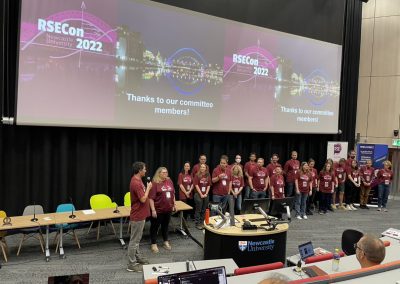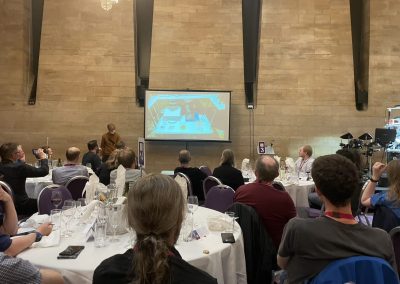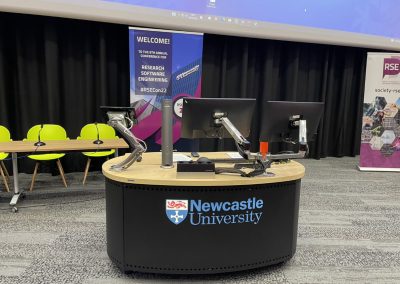Quistor joins Oracle attending the Society of Research Software Engineering Conference 2022
Newcastle, 8 Sep 2022 – It was our pleasure to join Oracle at the Society of Research Software Engineering’s sixth annual conference for a packed 3-day schedule of talks and pleasant dinning in the beautiful city of Newcastle. The Society was founded as a way of recognising software’s importance to research and the crucial role of the research software engineer. The event is a significant part of the calendar providing a platform for demonstrating the current skills and tools that help the community and offering a chance to promote collaboration between engineers.
The event featured two use cases for Oracle Cloud Infrastructure (OCI). Dr Vivien Raymond presented his fascinating work on observing the gravitational waves that form as a result of the collision of two black holes. The gravitational waveforms produce tiny signals which once detected are used to pinpoint these amazing high energy collisions, the locations of which can then be viewed by our telescopes back on earth. This observation-driven piece of scientific research benefitted from these Characteristics of OCI.
- Scalability: Once an observation is made there is a sudden need for a lot of compute power so they ‘burst’ into the cloud to meet this need.
- Flexibility: Flexible hardware options on the cloud cover the various needs of researchers. Arm, Intel, and AMD CPU cores, and Nvidia A100/P100 GPU’s.
- Cutting edge hardware: New technology is released onto the Oracle Cloud allowing for quick testing and adoption outside of normal hardware procurement cycles.
- Bare-metal servers: Dedicated bare metal instances have low latency and scale well for Numerical Relativity simulations, speeding up insights.
The University of Bristol presented their OpenGHG project, an open source platform for analysing greenhouse gas data. This project uses cloud native technologies and open source technologies to collate environmental data from multiple sources into one usable place. The goal of the platform is to help data providers share the data, help researchers analyse the data and enable simulations. By running in the Oracle Cloud users can log on from anywhere without the need for powerful hardware or compute time with a HPC cluster. The serverless fn platform was used which is able to move between clouds reducing vendor lock in, this platform powers OCI’s functions service meaning researchers can use the Fn Project CLI to perform operations on Oracle Functions. By using CI/CD pipelines in development and open source jupyter notebooks and fn to deploy on OCI the University of Bristol showed what makes OCI a research friendly platform. OCI is multi cloud friendly and Oracle themselves are huge advocates of open source technologies such as Oracle Linux.
As providers of OCI for research and higher education on the OCRE framework Quistor is ideally placed to assist Universities with testing and procuring OCI consumption credits and services. Interested parties can speak to us for tips for making use of the 300 USD free credits available to all, Oracle for research also provide 1,000 USD directly for researchers to use via their website. For Universities looking to test OCI’s Nvidia GPU’s alongside the available CPU Compute and bare metal servers can speak to Quistor about a proof of concept arrangement. Quistor is proud to support academic research in the UK and across other European countries.








